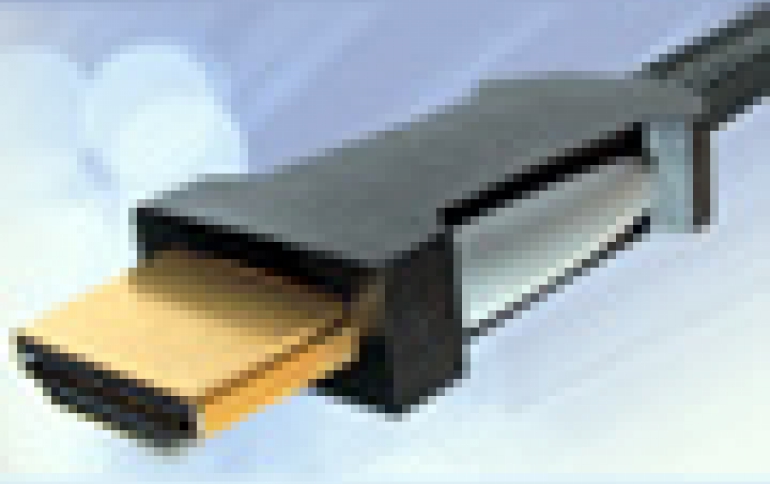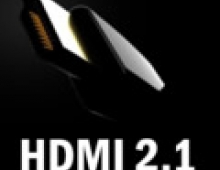
Latest Version Of HDMI Specification Specifies Mandatory 3D Formats For Broadcast Content
HDMI Licensing, LLC today announced the release of HDMI Specification Version 1.4a featuring key enhancements for 3D applications including the addition of mandatory 3D formats for broadcast content as well as the addition of the 3D format referred to as Top-and-Bottom.
The complete HDMI Specification Version 1.4a, along with the 1.4a version of the Compliance Test Specification (CTS), is available to Adopters on the HDMI Adopter Extranet.
An extraction of the 3D portion of Specification Version 1.4a is available for public download on the HDMI Web site at http://www.hdmi.org. The purpose of the extraction document is to provide public access to the 3D portion of the HDMI Specification for those companies and organizations that are not HDMI Adopters but require access to this portion of the Specification.
"We published these latest enhancements to support the market need for broadcast 3D content," said Steve Venuti, president of HDMI Licensing, LLC. "When we launched 1.4 in June of 2009, we deferred the selection of mandatory 3D format(s) for broadcast content until the market direction was more clearly defined. The market has spoken and the HDMI Consortium has listened and responded to accommodate those market needs."
The latest HDMI Specification adds key enhancements to support the market requirements for bringing broadcast 3D content into the home:
1. The addition of Top-and-Bottom to the Specification.
2. The addition of two mandatory formats for broadcast content:
* Side-by-Side Horizontal
* Top-and-Bottom
With the addition of these two mandatory formats, the HDMI Specification Version 1.4a provides a level of interoperability for devices designed to deliver 3D content over the HDMI connection. The mandatory 3D formats are:
3D Mandatory Formats
* For movie content:
o Frame Packing
+ 1080p @ 23.98/24Hz
* For game content:
o Frame Packing
+ 720p @ 50 or 59.94/60Hz
* For broadcast content:
o Side-by-Side Horizontal
+ 1080i @ 50 or 59.94/60Hz
o Top-and-Bottom
+ 720p @ 50 or 59.94/60Hz
+ 1080p @ 23.97/24Hz
Implementing the mandatory formats of the HDMI Specification facilitates interoperability among devices, allowing devices to speak a common 3D language when transmitting and receiving 3D content. The mandatory requirements for devices implementing 3D formats are:
* Displays - must support all mandatory formats.
* Sources - must support at least one mandatory format.
* Repeaters - must be able to pass through all mandatory formats.
HDMI Adopters will have 90 days from the publication of the Specification Version 1.4a to build and sell products that are compliant with 1.4a as well as pass the CTS Version 1.4a, HDMI Licensing LLC said. This also applies to legacy set-top boxes that may have upgraded to use Specification Version 1.4 signaling.
An extraction of the 3D portion of Specification Version 1.4a is available for public download on the HDMI Web site at http://www.hdmi.org. The purpose of the extraction document is to provide public access to the 3D portion of the HDMI Specification for those companies and organizations that are not HDMI Adopters but require access to this portion of the Specification.
"We published these latest enhancements to support the market need for broadcast 3D content," said Steve Venuti, president of HDMI Licensing, LLC. "When we launched 1.4 in June of 2009, we deferred the selection of mandatory 3D format(s) for broadcast content until the market direction was more clearly defined. The market has spoken and the HDMI Consortium has listened and responded to accommodate those market needs."
The latest HDMI Specification adds key enhancements to support the market requirements for bringing broadcast 3D content into the home:
1. The addition of Top-and-Bottom to the Specification.
2. The addition of two mandatory formats for broadcast content:
* Side-by-Side Horizontal
* Top-and-Bottom
With the addition of these two mandatory formats, the HDMI Specification Version 1.4a provides a level of interoperability for devices designed to deliver 3D content over the HDMI connection. The mandatory 3D formats are:
3D Mandatory Formats
* For movie content:
o Frame Packing
+ 1080p @ 23.98/24Hz
* For game content:
o Frame Packing
+ 720p @ 50 or 59.94/60Hz
* For broadcast content:
o Side-by-Side Horizontal
+ 1080i @ 50 or 59.94/60Hz
o Top-and-Bottom
+ 720p @ 50 or 59.94/60Hz
+ 1080p @ 23.97/24Hz
Implementing the mandatory formats of the HDMI Specification facilitates interoperability among devices, allowing devices to speak a common 3D language when transmitting and receiving 3D content. The mandatory requirements for devices implementing 3D formats are:
* Displays - must support all mandatory formats.
* Sources - must support at least one mandatory format.
* Repeaters - must be able to pass through all mandatory formats.
HDMI Adopters will have 90 days from the publication of the Specification Version 1.4a to build and sell products that are compliant with 1.4a as well as pass the CTS Version 1.4a, HDMI Licensing LLC said. This also applies to legacy set-top boxes that may have upgraded to use Specification Version 1.4 signaling.


















